Management & Operations Report: Manager and Leader Roles Analysis
VerifiedAdded on 2022/12/28
|12
|3098
|500
Report
AI Summary
This report delves into the distinct roles of managers and leaders within the context of operation management, using John Lewis as a case study. It defines the functions of managers, who oversee organizational activities, and leaders, who set the strategic vision. The report explores the characteristics of both roles, highlighting their responsibilities in resource allocation and decision-making, particularly in pre- and post-Brexit scenarios. It examines various leadership theories, including contingency, transactional, transformational, and trait theories, and their application in different situations. Furthermore, the report analyzes operational management approaches such as Six Sigma, Lean Management, Total Quality Management, and Just in Time, detailing how managers and leaders can improve efficiency and achieve organizational objectives through waste reduction, inventory management, and cost reduction strategies. The report concludes by emphasizing the importance of both managerial and leadership skills in driving organizational success.
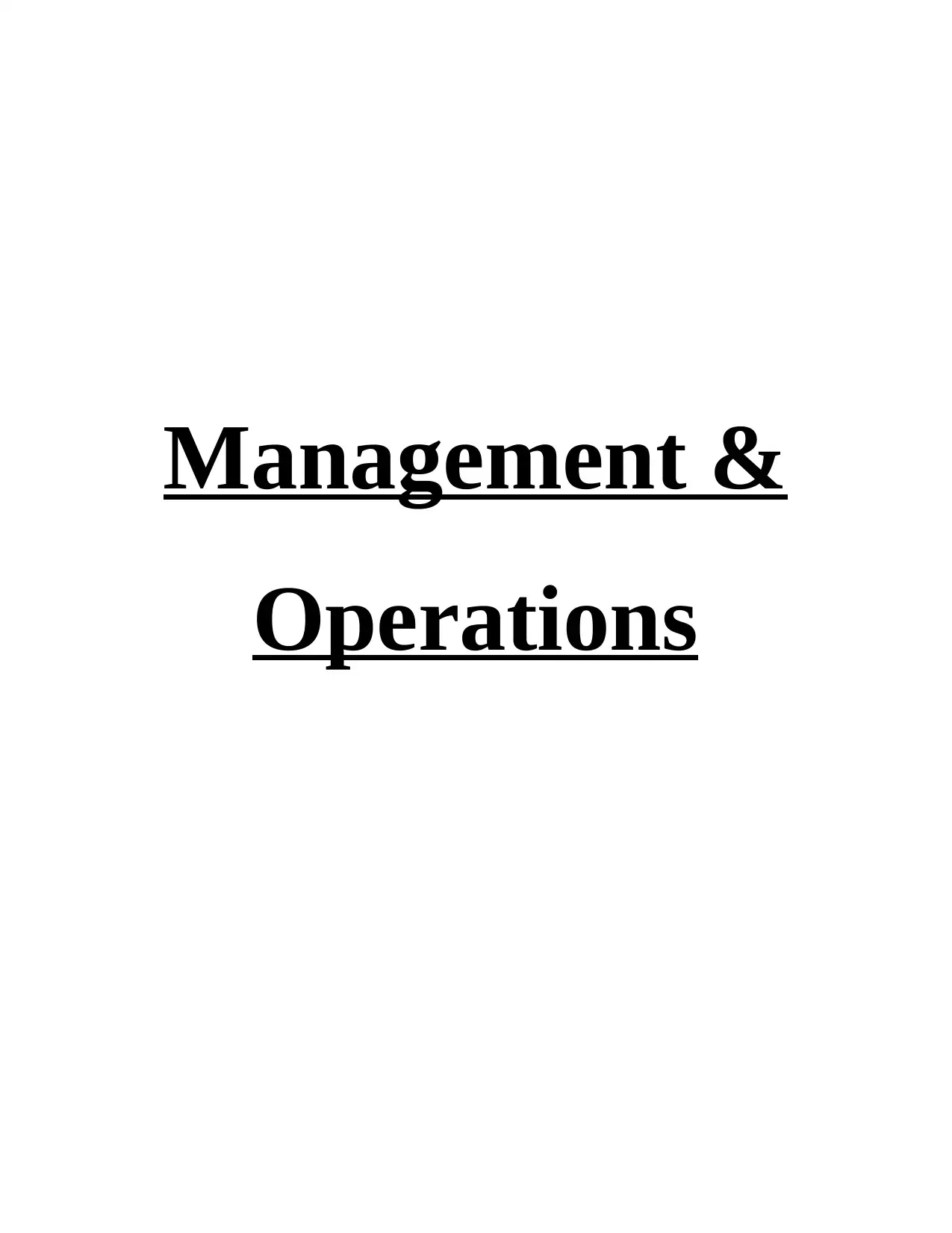
Management &
Operations
Operations
Paraphrase This Document
Need a fresh take? Get an instant paraphrase of this document with our AI Paraphraser
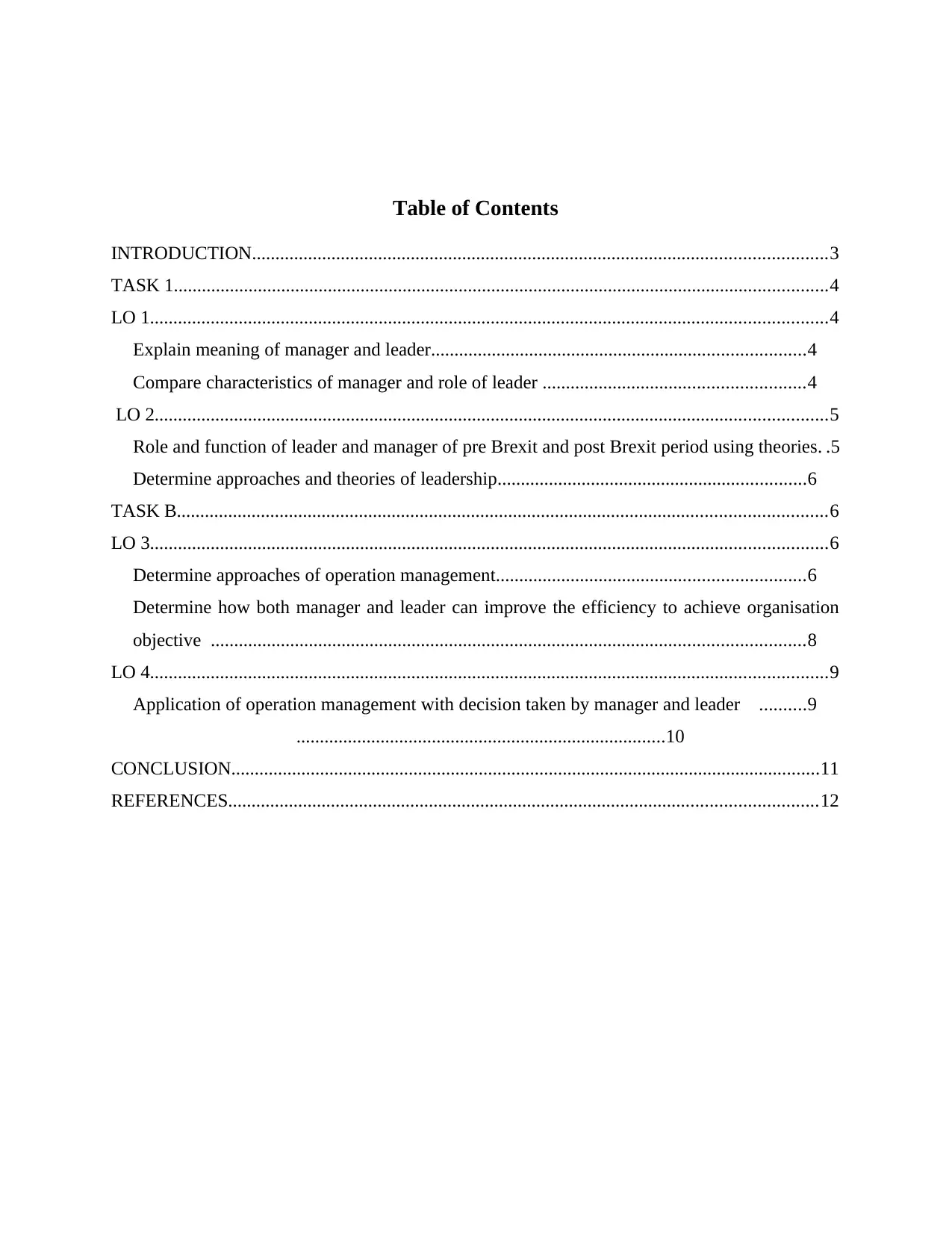
Table of Contents
INTRODUCTION...........................................................................................................................3
TASK 1............................................................................................................................................4
LO 1.................................................................................................................................................4
Explain meaning of manager and leader................................................................................4
Compare characteristics of manager and role of leader ........................................................4
LO 2................................................................................................................................................5
Role and function of leader and manager of pre Brexit and post Brexit period using theories. .5
Determine approaches and theories of leadership..................................................................6
TASK B...........................................................................................................................................6
LO 3.................................................................................................................................................6
Determine approaches of operation management..................................................................6
Determine how both manager and leader can improve the efficiency to achieve organisation
objective ...............................................................................................................................8
LO 4.................................................................................................................................................9
Application of operation management with decision taken by manager and leader ..........9
...............................................................................10
CONCLUSION..............................................................................................................................11
REFERENCES..............................................................................................................................12
INTRODUCTION...........................................................................................................................3
TASK 1............................................................................................................................................4
LO 1.................................................................................................................................................4
Explain meaning of manager and leader................................................................................4
Compare characteristics of manager and role of leader ........................................................4
LO 2................................................................................................................................................5
Role and function of leader and manager of pre Brexit and post Brexit period using theories. .5
Determine approaches and theories of leadership..................................................................6
TASK B...........................................................................................................................................6
LO 3.................................................................................................................................................6
Determine approaches of operation management..................................................................6
Determine how both manager and leader can improve the efficiency to achieve organisation
objective ...............................................................................................................................8
LO 4.................................................................................................................................................9
Application of operation management with decision taken by manager and leader ..........9
...............................................................................10
CONCLUSION..............................................................................................................................11
REFERENCES..............................................................................................................................12
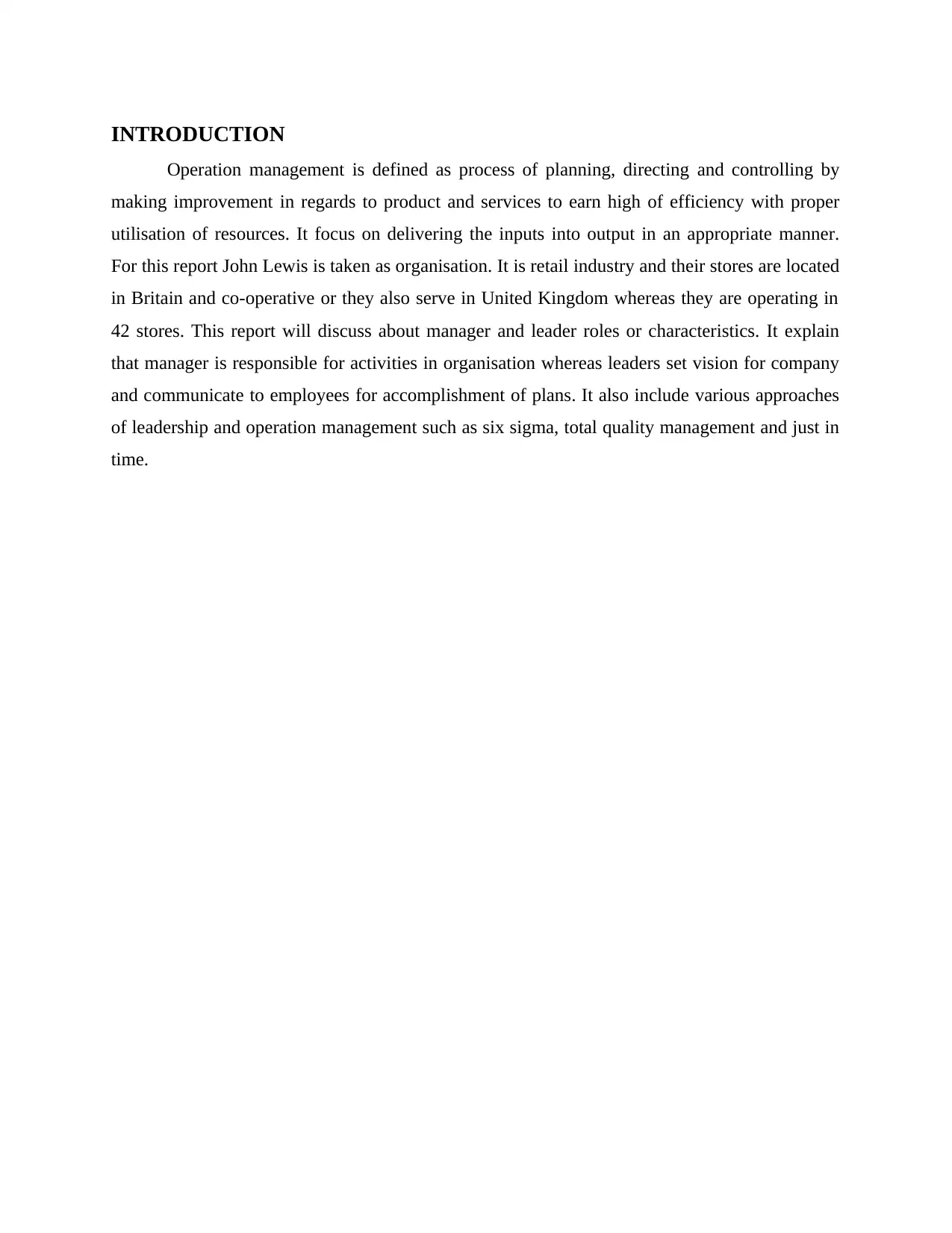
INTRODUCTION
Operation management is defined as process of planning, directing and controlling by
making improvement in regards to product and services to earn high of efficiency with proper
utilisation of resources. It focus on delivering the inputs into output in an appropriate manner.
For this report John Lewis is taken as organisation. It is retail industry and their stores are located
in Britain and co-operative or they also serve in United Kingdom whereas they are operating in
42 stores. This report will discuss about manager and leader roles or characteristics. It explain
that manager is responsible for activities in organisation whereas leaders set vision for company
and communicate to employees for accomplishment of plans. It also include various approaches
of leadership and operation management such as six sigma, total quality management and just in
time.
Operation management is defined as process of planning, directing and controlling by
making improvement in regards to product and services to earn high of efficiency with proper
utilisation of resources. It focus on delivering the inputs into output in an appropriate manner.
For this report John Lewis is taken as organisation. It is retail industry and their stores are located
in Britain and co-operative or they also serve in United Kingdom whereas they are operating in
42 stores. This report will discuss about manager and leader roles or characteristics. It explain
that manager is responsible for activities in organisation whereas leaders set vision for company
and communicate to employees for accomplishment of plans. It also include various approaches
of leadership and operation management such as six sigma, total quality management and just in
time.
⊘ This is a preview!⊘
Do you want full access?
Subscribe today to unlock all pages.

Trusted by 1+ million students worldwide
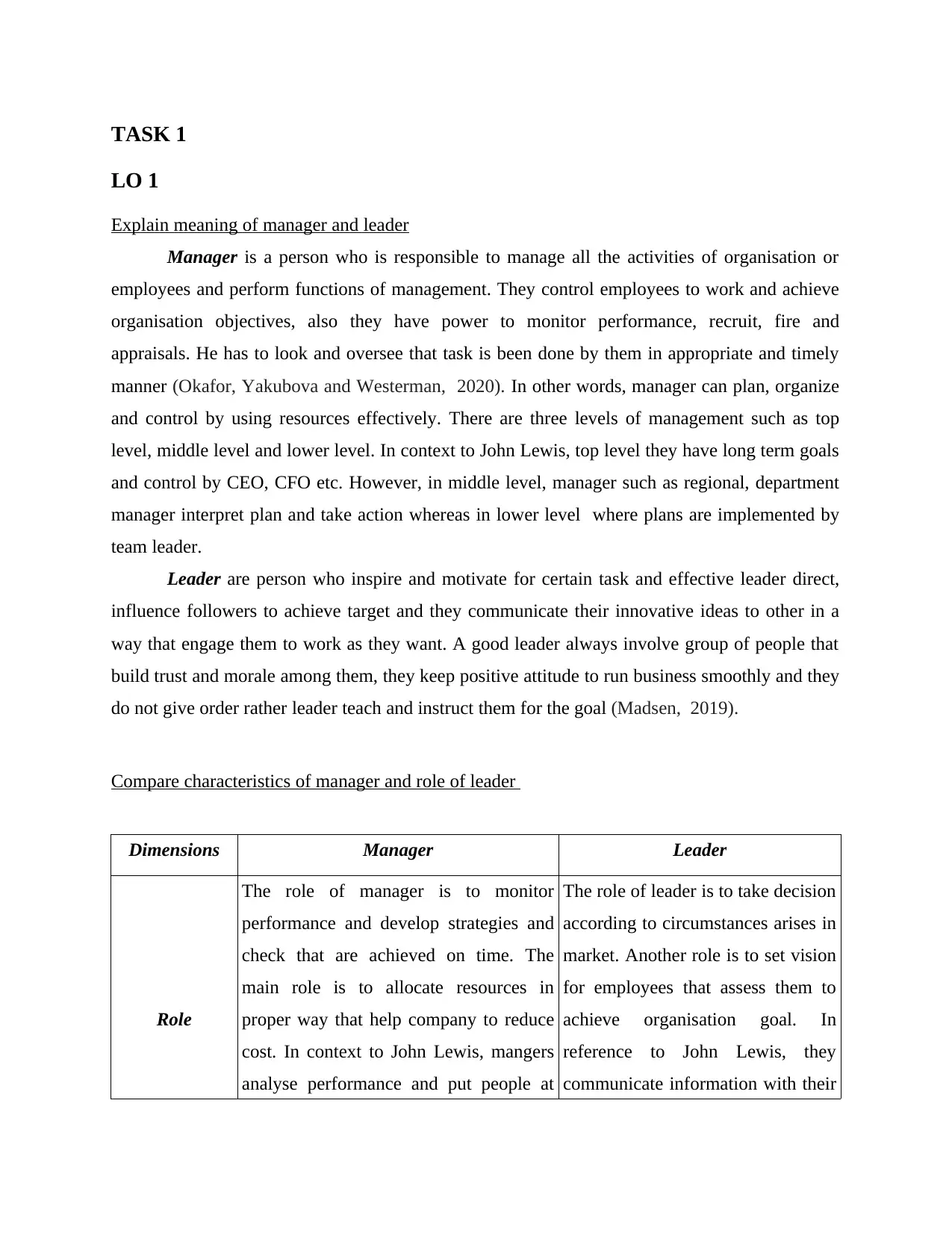
TASK 1
LO 1
Explain meaning of manager and leader
Manager is a person who is responsible to manage all the activities of organisation or
employees and perform functions of management. They control employees to work and achieve
organisation objectives, also they have power to monitor performance, recruit, fire and
appraisals. He has to look and oversee that task is been done by them in appropriate and timely
manner (Okafor, Yakubova and Westerman, 2020). In other words, manager can plan, organize
and control by using resources effectively. There are three levels of management such as top
level, middle level and lower level. In context to John Lewis, top level they have long term goals
and control by CEO, CFO etc. However, in middle level, manager such as regional, department
manager interpret plan and take action whereas in lower level where plans are implemented by
team leader.
Leader are person who inspire and motivate for certain task and effective leader direct,
influence followers to achieve target and they communicate their innovative ideas to other in a
way that engage them to work as they want. A good leader always involve group of people that
build trust and morale among them, they keep positive attitude to run business smoothly and they
do not give order rather leader teach and instruct them for the goal (Madsen, 2019).
Compare characteristics of manager and role of leader
Dimensions Manager Leader
Role
The role of manager is to monitor
performance and develop strategies and
check that are achieved on time. The
main role is to allocate resources in
proper way that help company to reduce
cost. In context to John Lewis, mangers
analyse performance and put people at
The role of leader is to take decision
according to circumstances arises in
market. Another role is to set vision
for employees that assess them to
achieve organisation goal. In
reference to John Lewis, they
communicate information with their
LO 1
Explain meaning of manager and leader
Manager is a person who is responsible to manage all the activities of organisation or
employees and perform functions of management. They control employees to work and achieve
organisation objectives, also they have power to monitor performance, recruit, fire and
appraisals. He has to look and oversee that task is been done by them in appropriate and timely
manner (Okafor, Yakubova and Westerman, 2020). In other words, manager can plan, organize
and control by using resources effectively. There are three levels of management such as top
level, middle level and lower level. In context to John Lewis, top level they have long term goals
and control by CEO, CFO etc. However, in middle level, manager such as regional, department
manager interpret plan and take action whereas in lower level where plans are implemented by
team leader.
Leader are person who inspire and motivate for certain task and effective leader direct,
influence followers to achieve target and they communicate their innovative ideas to other in a
way that engage them to work as they want. A good leader always involve group of people that
build trust and morale among them, they keep positive attitude to run business smoothly and they
do not give order rather leader teach and instruct them for the goal (Madsen, 2019).
Compare characteristics of manager and role of leader
Dimensions Manager Leader
Role
The role of manager is to monitor
performance and develop strategies and
check that are achieved on time. The
main role is to allocate resources in
proper way that help company to reduce
cost. In context to John Lewis, mangers
analyse performance and put people at
The role of leader is to take decision
according to circumstances arises in
market. Another role is to set vision
for employees that assess them to
achieve organisation goal. In
reference to John Lewis, they
communicate information with their
Paraphrase This Document
Need a fresh take? Get an instant paraphrase of this document with our AI Paraphraser
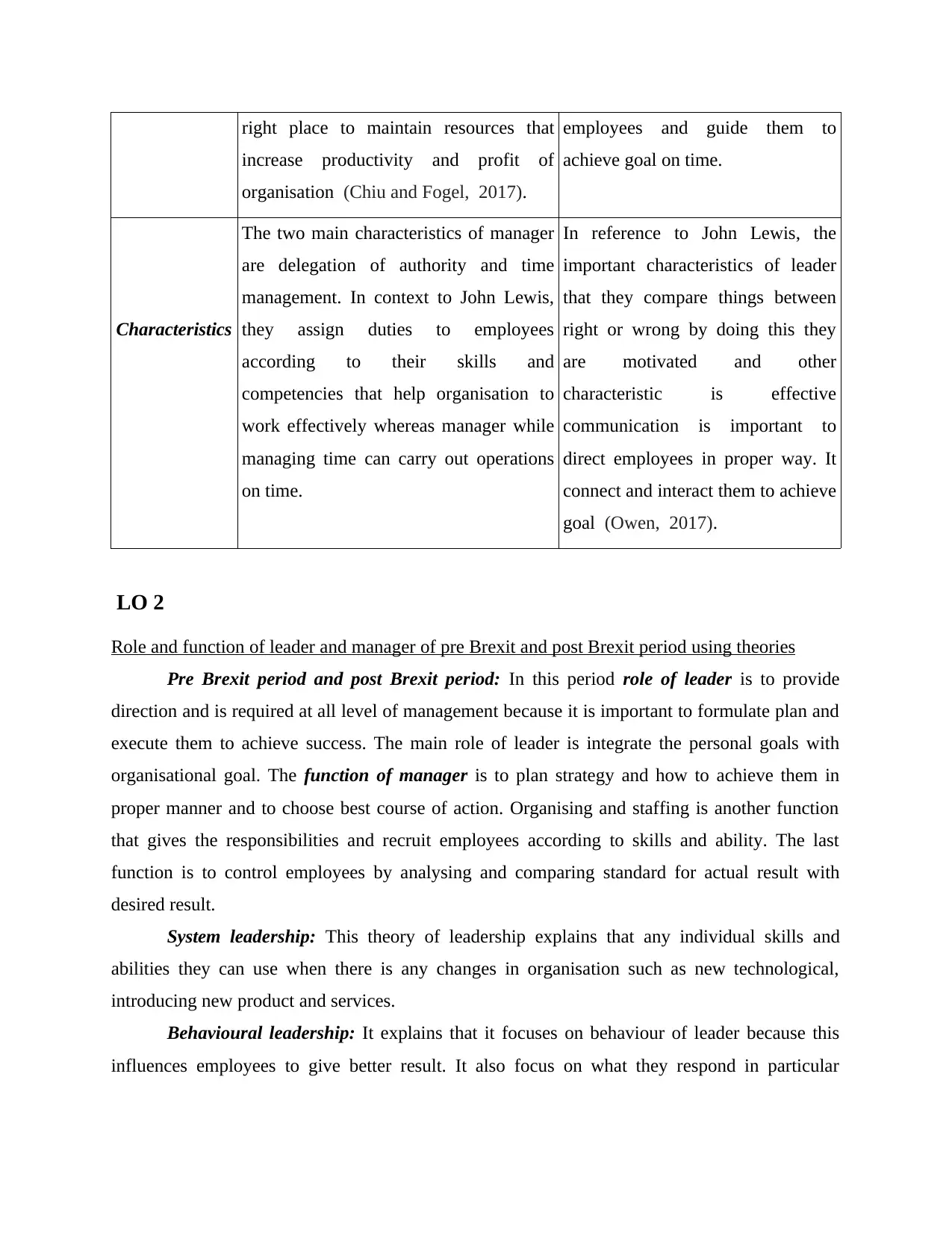
right place to maintain resources that
increase productivity and profit of
organisation (Chiu and Fogel, 2017).
employees and guide them to
achieve goal on time.
Characteristics
The two main characteristics of manager
are delegation of authority and time
management. In context to John Lewis,
they assign duties to employees
according to their skills and
competencies that help organisation to
work effectively whereas manager while
managing time can carry out operations
on time.
In reference to John Lewis, the
important characteristics of leader
that they compare things between
right or wrong by doing this they
are motivated and other
characteristic is effective
communication is important to
direct employees in proper way. It
connect and interact them to achieve
goal (Owen, 2017).
LO 2
Role and function of leader and manager of pre Brexit and post Brexit period using theories
Pre Brexit period and post Brexit period: In this period role of leader is to provide
direction and is required at all level of management because it is important to formulate plan and
execute them to achieve success. The main role of leader is integrate the personal goals with
organisational goal. The function of manager is to plan strategy and how to achieve them in
proper manner and to choose best course of action. Organising and staffing is another function
that gives the responsibilities and recruit employees according to skills and ability. The last
function is to control employees by analysing and comparing standard for actual result with
desired result.
System leadership: This theory of leadership explains that any individual skills and
abilities they can use when there is any changes in organisation such as new technological,
introducing new product and services.
Behavioural leadership: It explains that it focuses on behaviour of leader because this
influences employees to give better result. It also focus on what they respond in particular
increase productivity and profit of
organisation (Chiu and Fogel, 2017).
employees and guide them to
achieve goal on time.
Characteristics
The two main characteristics of manager
are delegation of authority and time
management. In context to John Lewis,
they assign duties to employees
according to their skills and
competencies that help organisation to
work effectively whereas manager while
managing time can carry out operations
on time.
In reference to John Lewis, the
important characteristics of leader
that they compare things between
right or wrong by doing this they
are motivated and other
characteristic is effective
communication is important to
direct employees in proper way. It
connect and interact them to achieve
goal (Owen, 2017).
LO 2
Role and function of leader and manager of pre Brexit and post Brexit period using theories
Pre Brexit period and post Brexit period: In this period role of leader is to provide
direction and is required at all level of management because it is important to formulate plan and
execute them to achieve success. The main role of leader is integrate the personal goals with
organisational goal. The function of manager is to plan strategy and how to achieve them in
proper manner and to choose best course of action. Organising and staffing is another function
that gives the responsibilities and recruit employees according to skills and ability. The last
function is to control employees by analysing and comparing standard for actual result with
desired result.
System leadership: This theory of leadership explains that any individual skills and
abilities they can use when there is any changes in organisation such as new technological,
introducing new product and services.
Behavioural leadership: It explains that it focuses on behaviour of leader because this
influences employees to give better result. It also focus on what they respond in particular
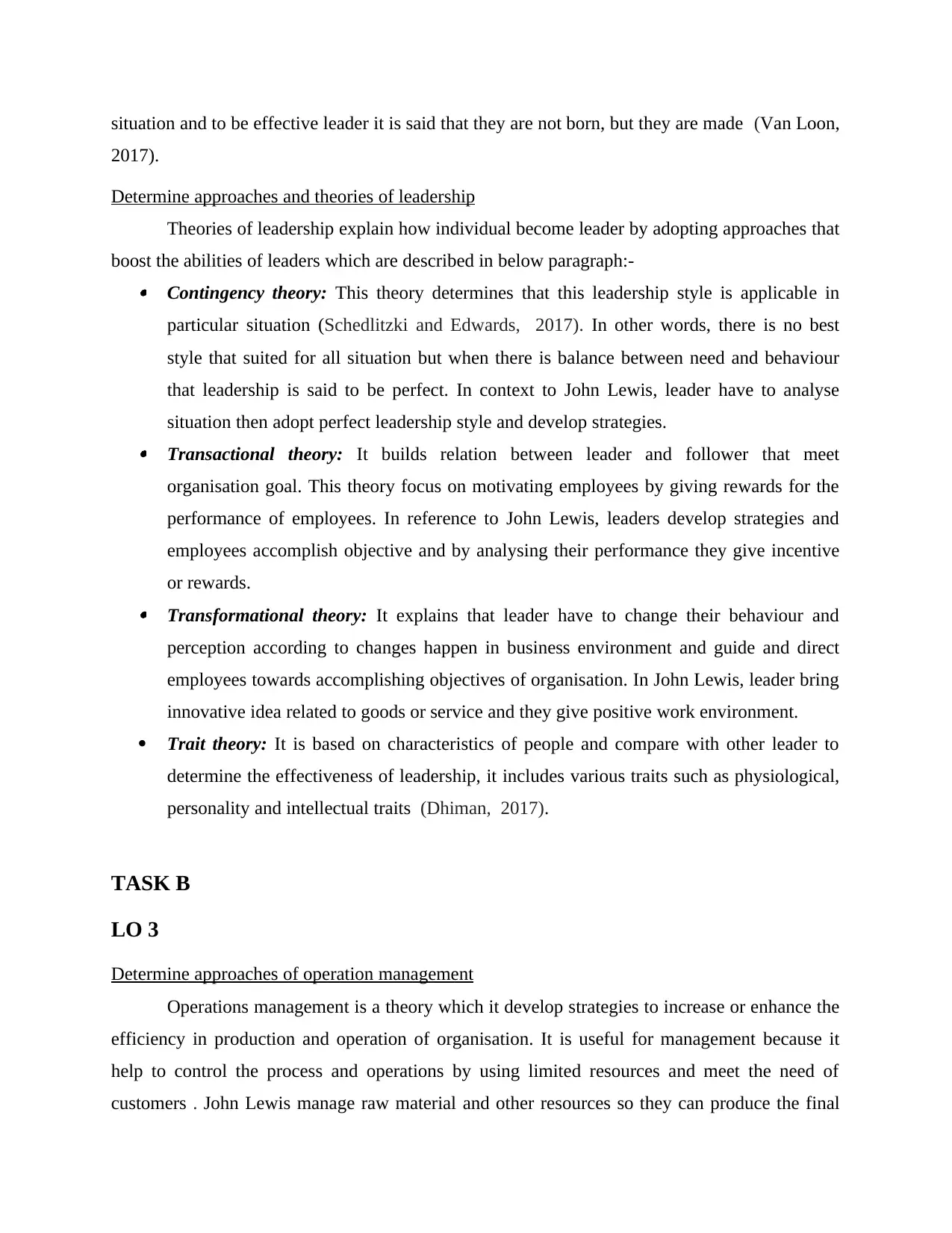
situation and to be effective leader it is said that they are not born, but they are made (Van Loon,
2017).
Determine approaches and theories of leadership
Theories of leadership explain how individual become leader by adopting approaches that
boost the abilities of leaders which are described in below paragraph:- Contingency theory: This theory determines that this leadership style is applicable in
particular situation (Schedlitzki and Edwards, 2017). In other words, there is no best
style that suited for all situation but when there is balance between need and behaviour
that leadership is said to be perfect. In context to John Lewis, leader have to analyse
situation then adopt perfect leadership style and develop strategies. Transactional theory: It builds relation between leader and follower that meet
organisation goal. This theory focus on motivating employees by giving rewards for the
performance of employees. In reference to John Lewis, leaders develop strategies and
employees accomplish objective and by analysing their performance they give incentive
or rewards. Transformational theory: It explains that leader have to change their behaviour and
perception according to changes happen in business environment and guide and direct
employees towards accomplishing objectives of organisation. In John Lewis, leader bring
innovative idea related to goods or service and they give positive work environment.
Trait theory: It is based on characteristics of people and compare with other leader to
determine the effectiveness of leadership, it includes various traits such as physiological,
personality and intellectual traits (Dhiman, 2017).
TASK B
LO 3
Determine approaches of operation management
Operations management is a theory which it develop strategies to increase or enhance the
efficiency in production and operation of organisation. It is useful for management because it
help to control the process and operations by using limited resources and meet the need of
customers . John Lewis manage raw material and other resources so they can produce the final
2017).
Determine approaches and theories of leadership
Theories of leadership explain how individual become leader by adopting approaches that
boost the abilities of leaders which are described in below paragraph:- Contingency theory: This theory determines that this leadership style is applicable in
particular situation (Schedlitzki and Edwards, 2017). In other words, there is no best
style that suited for all situation but when there is balance between need and behaviour
that leadership is said to be perfect. In context to John Lewis, leader have to analyse
situation then adopt perfect leadership style and develop strategies. Transactional theory: It builds relation between leader and follower that meet
organisation goal. This theory focus on motivating employees by giving rewards for the
performance of employees. In reference to John Lewis, leaders develop strategies and
employees accomplish objective and by analysing their performance they give incentive
or rewards. Transformational theory: It explains that leader have to change their behaviour and
perception according to changes happen in business environment and guide and direct
employees towards accomplishing objectives of organisation. In John Lewis, leader bring
innovative idea related to goods or service and they give positive work environment.
Trait theory: It is based on characteristics of people and compare with other leader to
determine the effectiveness of leadership, it includes various traits such as physiological,
personality and intellectual traits (Dhiman, 2017).
TASK B
LO 3
Determine approaches of operation management
Operations management is a theory which it develop strategies to increase or enhance the
efficiency in production and operation of organisation. It is useful for management because it
help to control the process and operations by using limited resources and meet the need of
customers . John Lewis manage raw material and other resources so they can produce the final
⊘ This is a preview!⊘
Do you want full access?
Subscribe today to unlock all pages.

Trusted by 1+ million students worldwide
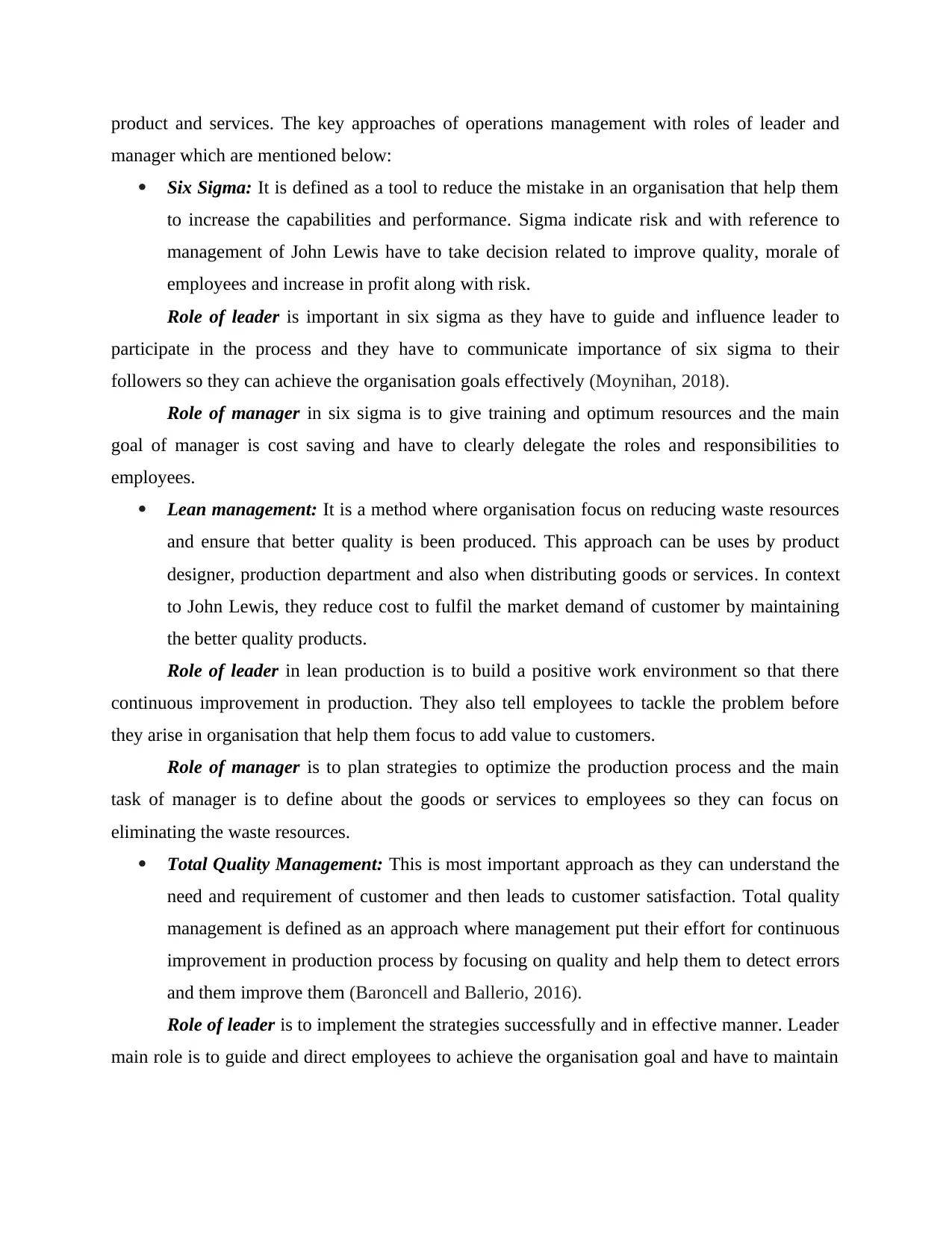
product and services. The key approaches of operations management with roles of leader and
manager which are mentioned below:
Six Sigma: It is defined as a tool to reduce the mistake in an organisation that help them
to increase the capabilities and performance. Sigma indicate risk and with reference to
management of John Lewis have to take decision related to improve quality, morale of
employees and increase in profit along with risk.
Role of leader is important in six sigma as they have to guide and influence leader to
participate in the process and they have to communicate importance of six sigma to their
followers so they can achieve the organisation goals effectively (Moynihan, 2018).
Role of manager in six sigma is to give training and optimum resources and the main
goal of manager is cost saving and have to clearly delegate the roles and responsibilities to
employees.
Lean management: It is a method where organisation focus on reducing waste resources
and ensure that better quality is been produced. This approach can be uses by product
designer, production department and also when distributing goods or services. In context
to John Lewis, they reduce cost to fulfil the market demand of customer by maintaining
the better quality products.
Role of leader in lean production is to build a positive work environment so that there
continuous improvement in production. They also tell employees to tackle the problem before
they arise in organisation that help them focus to add value to customers.
Role of manager is to plan strategies to optimize the production process and the main
task of manager is to define about the goods or services to employees so they can focus on
eliminating the waste resources.
Total Quality Management: This is most important approach as they can understand the
need and requirement of customer and then leads to customer satisfaction. Total quality
management is defined as an approach where management put their effort for continuous
improvement in production process by focusing on quality and help them to detect errors
and them improve them (Baroncell and Ballerio, 2016).
Role of leader is to implement the strategies successfully and in effective manner. Leader
main role is to guide and direct employees to achieve the organisation goal and have to maintain
manager which are mentioned below:
Six Sigma: It is defined as a tool to reduce the mistake in an organisation that help them
to increase the capabilities and performance. Sigma indicate risk and with reference to
management of John Lewis have to take decision related to improve quality, morale of
employees and increase in profit along with risk.
Role of leader is important in six sigma as they have to guide and influence leader to
participate in the process and they have to communicate importance of six sigma to their
followers so they can achieve the organisation goals effectively (Moynihan, 2018).
Role of manager in six sigma is to give training and optimum resources and the main
goal of manager is cost saving and have to clearly delegate the roles and responsibilities to
employees.
Lean management: It is a method where organisation focus on reducing waste resources
and ensure that better quality is been produced. This approach can be uses by product
designer, production department and also when distributing goods or services. In context
to John Lewis, they reduce cost to fulfil the market demand of customer by maintaining
the better quality products.
Role of leader in lean production is to build a positive work environment so that there
continuous improvement in production. They also tell employees to tackle the problem before
they arise in organisation that help them focus to add value to customers.
Role of manager is to plan strategies to optimize the production process and the main
task of manager is to define about the goods or services to employees so they can focus on
eliminating the waste resources.
Total Quality Management: This is most important approach as they can understand the
need and requirement of customer and then leads to customer satisfaction. Total quality
management is defined as an approach where management put their effort for continuous
improvement in production process by focusing on quality and help them to detect errors
and them improve them (Baroncell and Ballerio, 2016).
Role of leader is to implement the strategies successfully and in effective manner. Leader
main role is to guide and direct employees to achieve the organisation goal and have to maintain
Paraphrase This Document
Need a fresh take? Get an instant paraphrase of this document with our AI Paraphraser
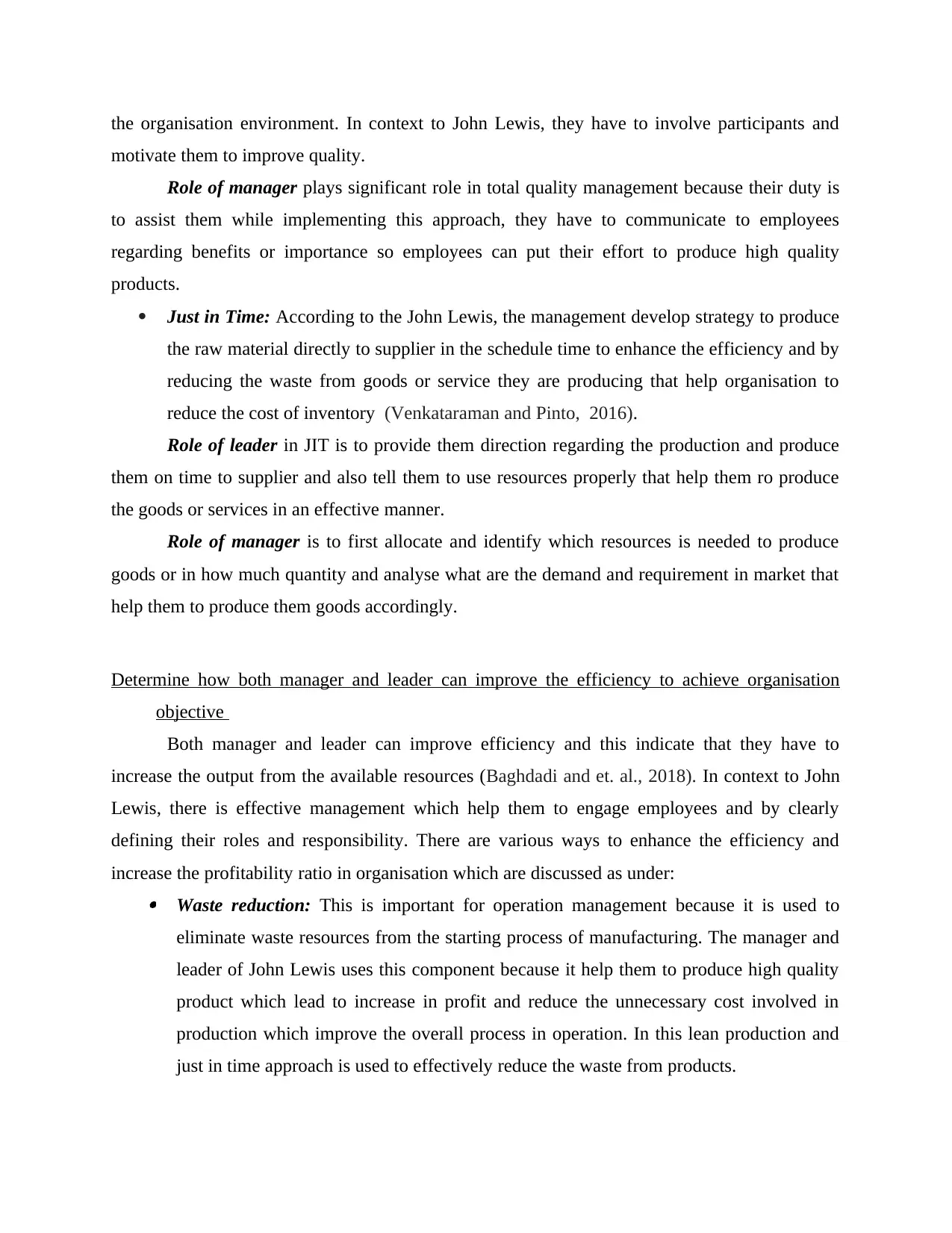
the organisation environment. In context to John Lewis, they have to involve participants and
motivate them to improve quality.
Role of manager plays significant role in total quality management because their duty is
to assist them while implementing this approach, they have to communicate to employees
regarding benefits or importance so employees can put their effort to produce high quality
products.
Just in Time: According to the John Lewis, the management develop strategy to produce
the raw material directly to supplier in the schedule time to enhance the efficiency and by
reducing the waste from goods or service they are producing that help organisation to
reduce the cost of inventory (Venkataraman and Pinto, 2016).
Role of leader in JIT is to provide them direction regarding the production and produce
them on time to supplier and also tell them to use resources properly that help them ro produce
the goods or services in an effective manner.
Role of manager is to first allocate and identify which resources is needed to produce
goods or in how much quantity and analyse what are the demand and requirement in market that
help them to produce them goods accordingly.
Determine how both manager and leader can improve the efficiency to achieve organisation
objective
Both manager and leader can improve efficiency and this indicate that they have to
increase the output from the available resources (Baghdadi and et. al., 2018). In context to John
Lewis, there is effective management which help them to engage employees and by clearly
defining their roles and responsibility. There are various ways to enhance the efficiency and
increase the profitability ratio in organisation which are discussed as under: Waste reduction: This is important for operation management because it is used to
eliminate waste resources from the starting process of manufacturing. The manager and
leader of John Lewis uses this component because it help them to produce high quality
product which lead to increase in profit and reduce the unnecessary cost involved in
production which improve the overall process in operation. In this lean production and
just in time approach is used to effectively reduce the waste from products.
motivate them to improve quality.
Role of manager plays significant role in total quality management because their duty is
to assist them while implementing this approach, they have to communicate to employees
regarding benefits or importance so employees can put their effort to produce high quality
products.
Just in Time: According to the John Lewis, the management develop strategy to produce
the raw material directly to supplier in the schedule time to enhance the efficiency and by
reducing the waste from goods or service they are producing that help organisation to
reduce the cost of inventory (Venkataraman and Pinto, 2016).
Role of leader in JIT is to provide them direction regarding the production and produce
them on time to supplier and also tell them to use resources properly that help them ro produce
the goods or services in an effective manner.
Role of manager is to first allocate and identify which resources is needed to produce
goods or in how much quantity and analyse what are the demand and requirement in market that
help them to produce them goods accordingly.
Determine how both manager and leader can improve the efficiency to achieve organisation
objective
Both manager and leader can improve efficiency and this indicate that they have to
increase the output from the available resources (Baghdadi and et. al., 2018). In context to John
Lewis, there is effective management which help them to engage employees and by clearly
defining their roles and responsibility. There are various ways to enhance the efficiency and
increase the profitability ratio in organisation which are discussed as under: Waste reduction: This is important for operation management because it is used to
eliminate waste resources from the starting process of manufacturing. The manager and
leader of John Lewis uses this component because it help them to produce high quality
product which lead to increase in profit and reduce the unnecessary cost involved in
production which improve the overall process in operation. In this lean production and
just in time approach is used to effectively reduce the waste from products.
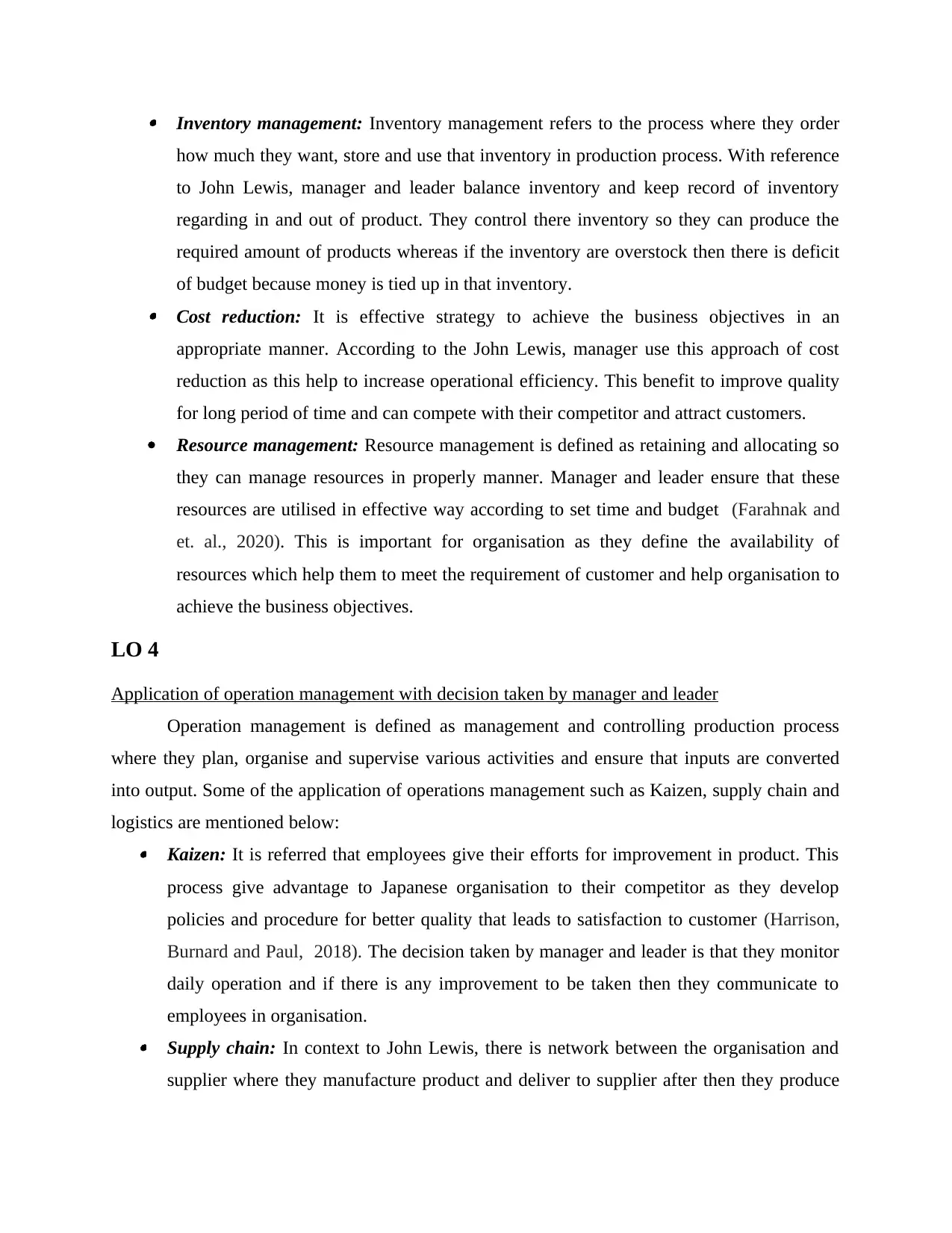
Inventory management: Inventory management refers to the process where they order
how much they want, store and use that inventory in production process. With reference
to John Lewis, manager and leader balance inventory and keep record of inventory
regarding in and out of product. They control there inventory so they can produce the
required amount of products whereas if the inventory are overstock then there is deficit
of budget because money is tied up in that inventory. Cost reduction: It is effective strategy to achieve the business objectives in an
appropriate manner. According to the John Lewis, manager use this approach of cost
reduction as this help to increase operational efficiency. This benefit to improve quality
for long period of time and can compete with their competitor and attract customers.
Resource management: Resource management is defined as retaining and allocating so
they can manage resources in properly manner. Manager and leader ensure that these
resources are utilised in effective way according to set time and budget (Farahnak and
et. al., 2020). This is important for organisation as they define the availability of
resources which help them to meet the requirement of customer and help organisation to
achieve the business objectives.
LO 4
Application of operation management with decision taken by manager and leader
Operation management is defined as management and controlling production process
where they plan, organise and supervise various activities and ensure that inputs are converted
into output. Some of the application of operations management such as Kaizen, supply chain and
logistics are mentioned below: Kaizen: It is referred that employees give their efforts for improvement in product. This
process give advantage to Japanese organisation to their competitor as they develop
policies and procedure for better quality that leads to satisfaction to customer (Harrison,
Burnard and Paul, 2018). The decision taken by manager and leader is that they monitor
daily operation and if there is any improvement to be taken then they communicate to
employees in organisation. Supply chain: In context to John Lewis, there is network between the organisation and
supplier where they manufacture product and deliver to supplier after then they produce
how much they want, store and use that inventory in production process. With reference
to John Lewis, manager and leader balance inventory and keep record of inventory
regarding in and out of product. They control there inventory so they can produce the
required amount of products whereas if the inventory are overstock then there is deficit
of budget because money is tied up in that inventory. Cost reduction: It is effective strategy to achieve the business objectives in an
appropriate manner. According to the John Lewis, manager use this approach of cost
reduction as this help to increase operational efficiency. This benefit to improve quality
for long period of time and can compete with their competitor and attract customers.
Resource management: Resource management is defined as retaining and allocating so
they can manage resources in properly manner. Manager and leader ensure that these
resources are utilised in effective way according to set time and budget (Farahnak and
et. al., 2020). This is important for organisation as they define the availability of
resources which help them to meet the requirement of customer and help organisation to
achieve the business objectives.
LO 4
Application of operation management with decision taken by manager and leader
Operation management is defined as management and controlling production process
where they plan, organise and supervise various activities and ensure that inputs are converted
into output. Some of the application of operations management such as Kaizen, supply chain and
logistics are mentioned below: Kaizen: It is referred that employees give their efforts for improvement in product. This
process give advantage to Japanese organisation to their competitor as they develop
policies and procedure for better quality that leads to satisfaction to customer (Harrison,
Burnard and Paul, 2018). The decision taken by manager and leader is that they monitor
daily operation and if there is any improvement to be taken then they communicate to
employees in organisation. Supply chain: In context to John Lewis, there is network between the organisation and
supplier where they manufacture product and deliver to supplier after then they produce
⊘ This is a preview!⊘
Do you want full access?
Subscribe today to unlock all pages.

Trusted by 1+ million students worldwide
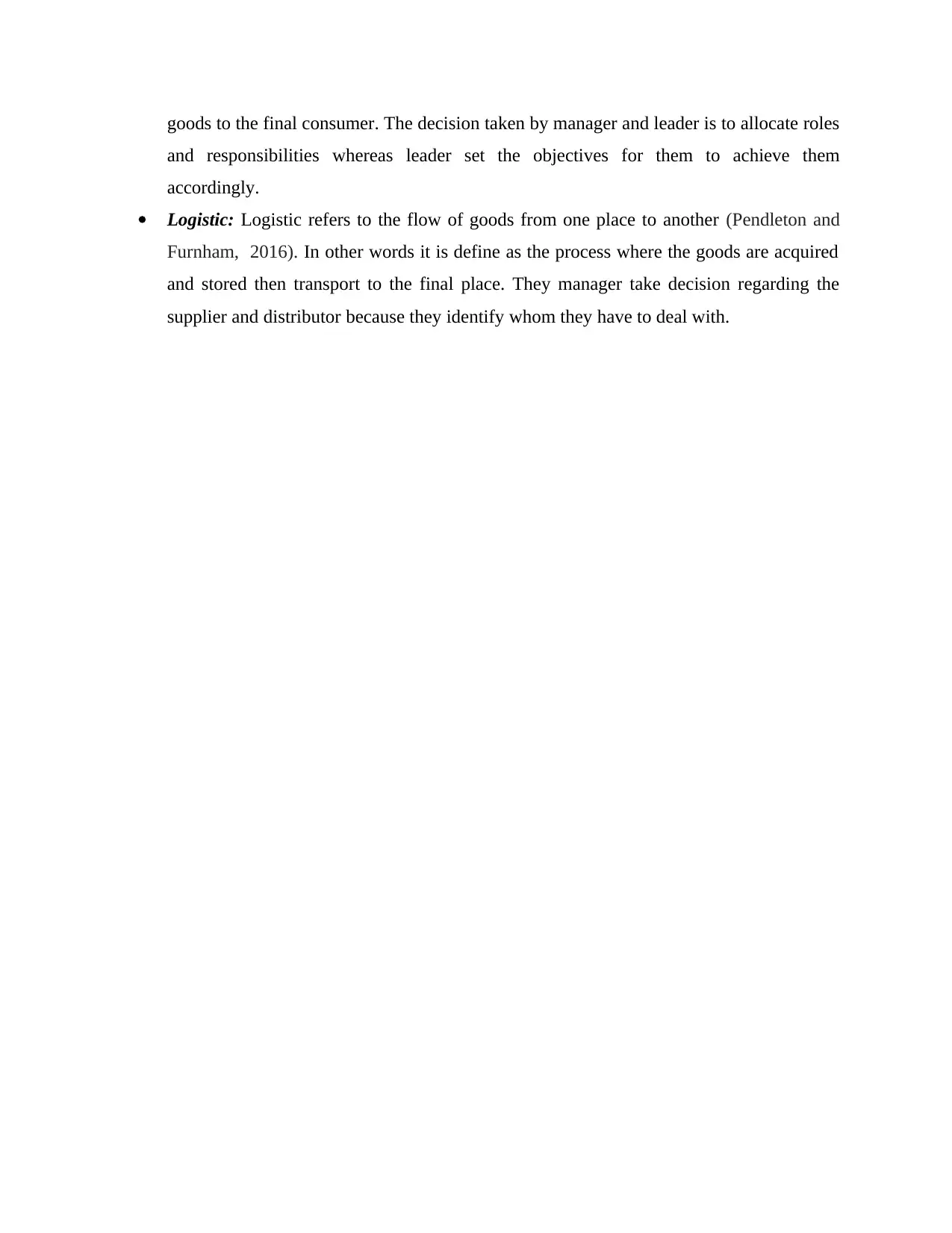
goods to the final consumer. The decision taken by manager and leader is to allocate roles
and responsibilities whereas leader set the objectives for them to achieve them
accordingly.
Logistic: Logistic refers to the flow of goods from one place to another (Pendleton and
Furnham, 2016). In other words it is define as the process where the goods are acquired
and stored then transport to the final place. They manager take decision regarding the
supplier and distributor because they identify whom they have to deal with.
and responsibilities whereas leader set the objectives for them to achieve them
accordingly.
Logistic: Logistic refers to the flow of goods from one place to another (Pendleton and
Furnham, 2016). In other words it is define as the process where the goods are acquired
and stored then transport to the final place. They manager take decision regarding the
supplier and distributor because they identify whom they have to deal with.
Paraphrase This Document
Need a fresh take? Get an instant paraphrase of this document with our AI Paraphraser
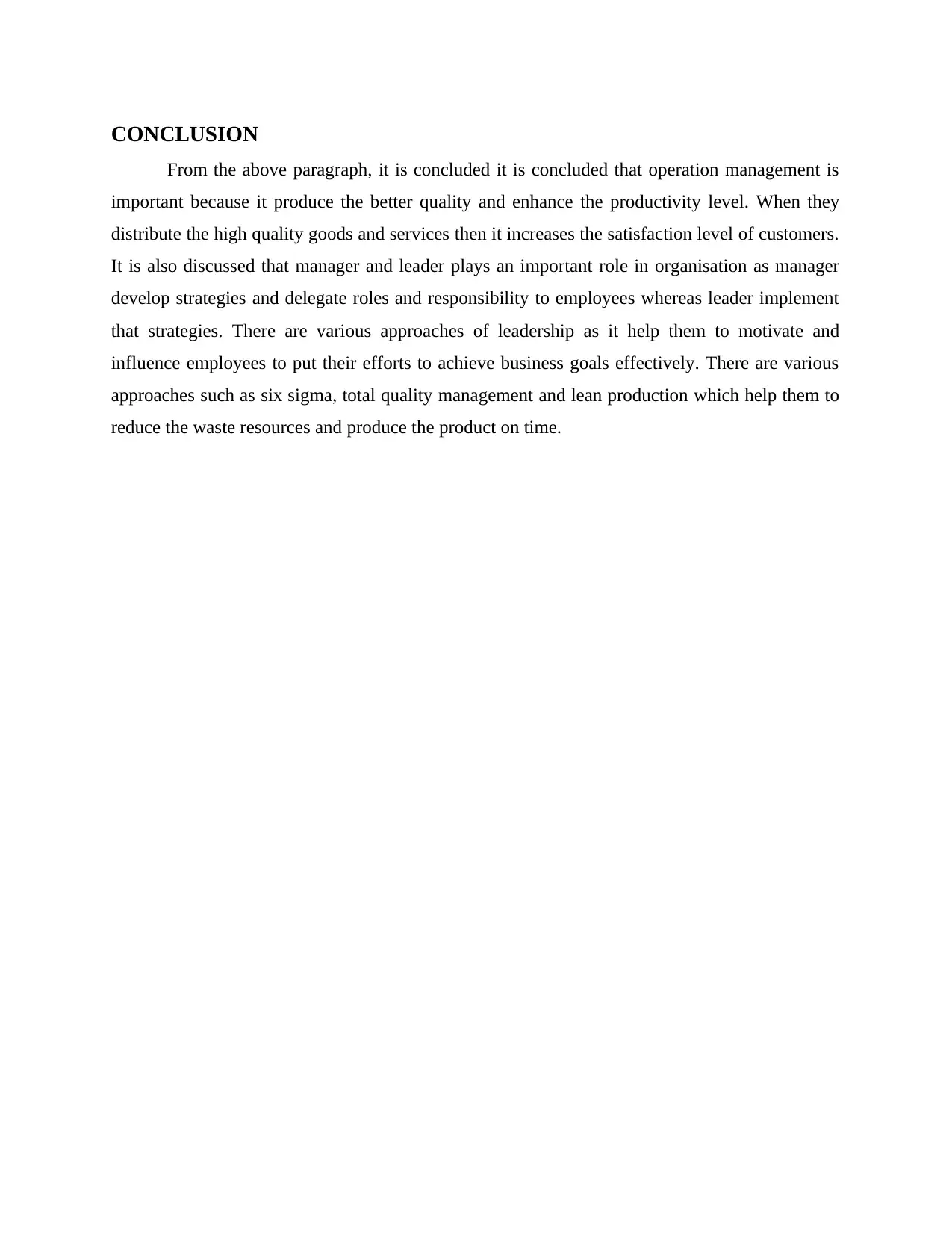
CONCLUSION
From the above paragraph, it is concluded it is concluded that operation management is
important because it produce the better quality and enhance the productivity level. When they
distribute the high quality goods and services then it increases the satisfaction level of customers.
It is also discussed that manager and leader plays an important role in organisation as manager
develop strategies and delegate roles and responsibility to employees whereas leader implement
that strategies. There are various approaches of leadership as it help them to motivate and
influence employees to put their efforts to achieve business goals effectively. There are various
approaches such as six sigma, total quality management and lean production which help them to
reduce the waste resources and produce the product on time.
From the above paragraph, it is concluded it is concluded that operation management is
important because it produce the better quality and enhance the productivity level. When they
distribute the high quality goods and services then it increases the satisfaction level of customers.
It is also discussed that manager and leader plays an important role in organisation as manager
develop strategies and delegate roles and responsibility to employees whereas leader implement
that strategies. There are various approaches of leadership as it help them to motivate and
influence employees to put their efforts to achieve business goals effectively. There are various
approaches such as six sigma, total quality management and lean production which help them to
reduce the waste resources and produce the product on time.
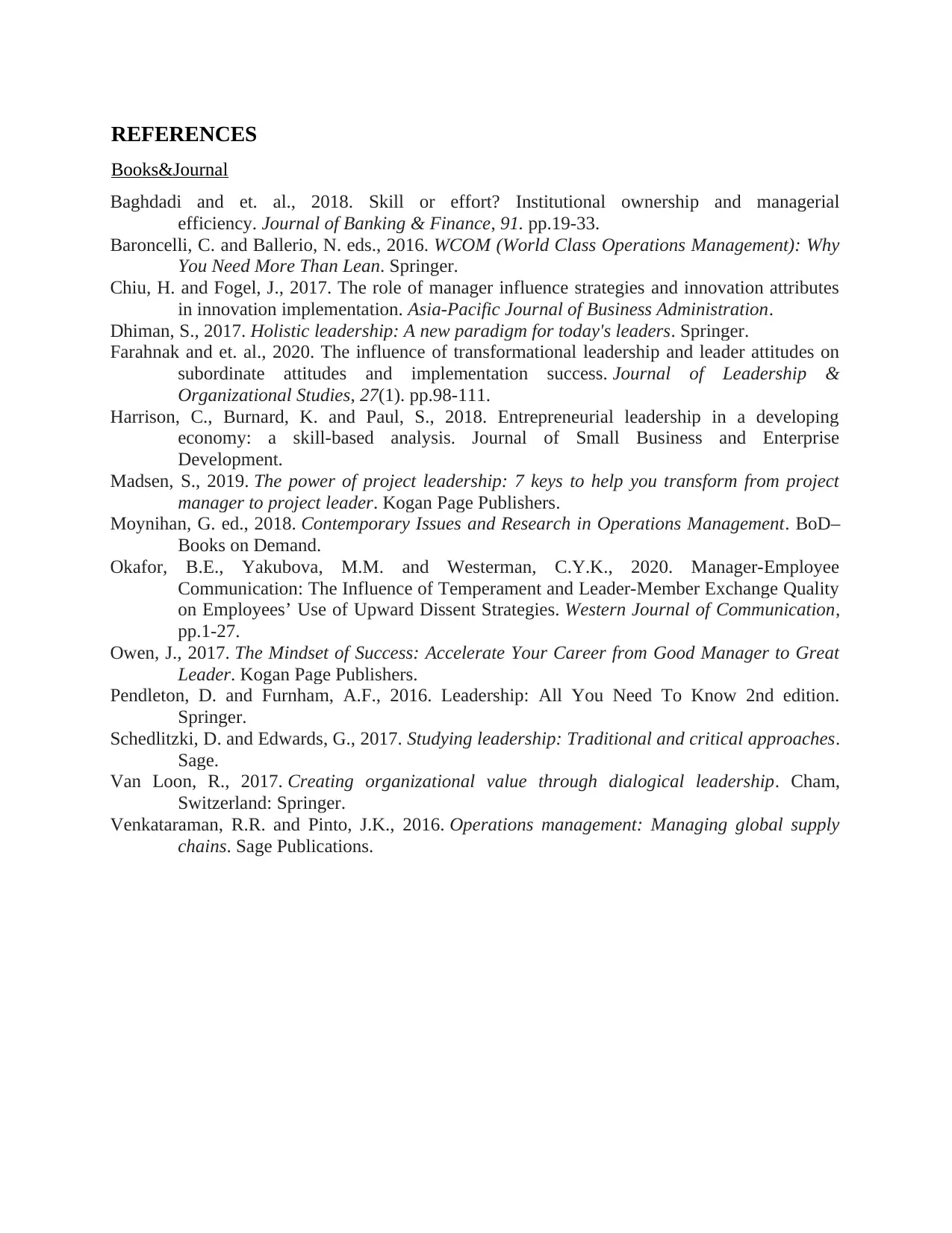
REFERENCES
Books&Journal
Baghdadi and et. al., 2018. Skill or effort? Institutional ownership and managerial
efficiency. Journal of Banking & Finance, 91. pp.19-33.
Baroncelli, C. and Ballerio, N. eds., 2016. WCOM (World Class Operations Management): Why
You Need More Than Lean. Springer.
Chiu, H. and Fogel, J., 2017. The role of manager influence strategies and innovation attributes
in innovation implementation. Asia-Pacific Journal of Business Administration.
Dhiman, S., 2017. Holistic leadership: A new paradigm for today's leaders. Springer.
Farahnak and et. al., 2020. The influence of transformational leadership and leader attitudes on
subordinate attitudes and implementation success. Journal of Leadership &
Organizational Studies, 27(1). pp.98-111.
Harrison, C., Burnard, K. and Paul, S., 2018. Entrepreneurial leadership in a developing
economy: a skill-based analysis. Journal of Small Business and Enterprise
Development.
Madsen, S., 2019. The power of project leadership: 7 keys to help you transform from project
manager to project leader. Kogan Page Publishers.
Moynihan, G. ed., 2018. Contemporary Issues and Research in Operations Management. BoD–
Books on Demand.
Okafor, B.E., Yakubova, M.M. and Westerman, C.Y.K., 2020. Manager-Employee
Communication: The Influence of Temperament and Leader-Member Exchange Quality
on Employees’ Use of Upward Dissent Strategies. Western Journal of Communication,
pp.1-27.
Owen, J., 2017. The Mindset of Success: Accelerate Your Career from Good Manager to Great
Leader. Kogan Page Publishers.
Pendleton, D. and Furnham, A.F., 2016. Leadership: All You Need To Know 2nd edition.
Springer.
Schedlitzki, D. and Edwards, G., 2017. Studying leadership: Traditional and critical approaches.
Sage.
Van Loon, R., 2017. Creating organizational value through dialogical leadership. Cham,
Switzerland: Springer.
Venkataraman, R.R. and Pinto, J.K., 2016. Operations management: Managing global supply
chains. Sage Publications.
Books&Journal
Baghdadi and et. al., 2018. Skill or effort? Institutional ownership and managerial
efficiency. Journal of Banking & Finance, 91. pp.19-33.
Baroncelli, C. and Ballerio, N. eds., 2016. WCOM (World Class Operations Management): Why
You Need More Than Lean. Springer.
Chiu, H. and Fogel, J., 2017. The role of manager influence strategies and innovation attributes
in innovation implementation. Asia-Pacific Journal of Business Administration.
Dhiman, S., 2017. Holistic leadership: A new paradigm for today's leaders. Springer.
Farahnak and et. al., 2020. The influence of transformational leadership and leader attitudes on
subordinate attitudes and implementation success. Journal of Leadership &
Organizational Studies, 27(1). pp.98-111.
Harrison, C., Burnard, K. and Paul, S., 2018. Entrepreneurial leadership in a developing
economy: a skill-based analysis. Journal of Small Business and Enterprise
Development.
Madsen, S., 2019. The power of project leadership: 7 keys to help you transform from project
manager to project leader. Kogan Page Publishers.
Moynihan, G. ed., 2018. Contemporary Issues and Research in Operations Management. BoD–
Books on Demand.
Okafor, B.E., Yakubova, M.M. and Westerman, C.Y.K., 2020. Manager-Employee
Communication: The Influence of Temperament and Leader-Member Exchange Quality
on Employees’ Use of Upward Dissent Strategies. Western Journal of Communication,
pp.1-27.
Owen, J., 2017. The Mindset of Success: Accelerate Your Career from Good Manager to Great
Leader. Kogan Page Publishers.
Pendleton, D. and Furnham, A.F., 2016. Leadership: All You Need To Know 2nd edition.
Springer.
Schedlitzki, D. and Edwards, G., 2017. Studying leadership: Traditional and critical approaches.
Sage.
Van Loon, R., 2017. Creating organizational value through dialogical leadership. Cham,
Switzerland: Springer.
Venkataraman, R.R. and Pinto, J.K., 2016. Operations management: Managing global supply
chains. Sage Publications.
⊘ This is a preview!⊘
Do you want full access?
Subscribe today to unlock all pages.

Trusted by 1+ million students worldwide
1 out of 12
Related Documents
Your All-in-One AI-Powered Toolkit for Academic Success.
+13062052269
info@desklib.com
Available 24*7 on WhatsApp / Email
![[object Object]](/_next/static/media/star-bottom.7253800d.svg)
Unlock your academic potential
Copyright © 2020–2026 A2Z Services. All Rights Reserved. Developed and managed by ZUCOL.





